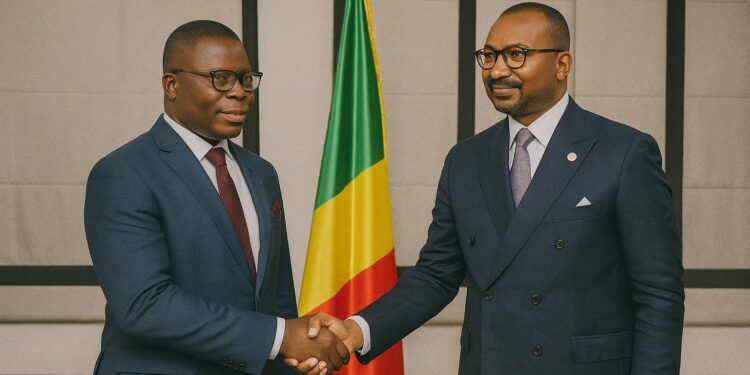Strategic overtures in Brazzaville
The high-ceilinged reception hall of the Ministry of International Cooperation in Brazzaville provided an almost ceremonial backdrop when Dr Vincent Dossou Sodjinou, the World Health Organization’s new resident representative, met Minister Denis Christel Sassou Nguesso. Far from a routine courtesy call, the encounter crystallised a mutual resolve to elevate primary health care as the fulcrum of Congo-Brazzaville’s public health architecture. Speaking after the audience, Dr Sodjinou underscored the need for “appropriate mechanisms” to deepen the reach of essential services, a formulation that diplomats present interpreted as a pledge to translate normative WHO guidance into locally grounded action.
Primary care as cornerstone of resilience
Although the Republic of the Congo avoided the worst epidemiological scenarios anticipated at the height of the COVID-19 pandemic, recent cholera flare-ups along riverine trade routes have exposed structural vulnerabilities. WHO’s country cooperation strategy for 2023-2027 already lists the revitalisation of district health systems among its top three priorities, and the Congolese Cabinet has adopted Universal Health Insurance legislation that explicitly hinges on robust first-line facilities. By placing primary health care at the centre of their dialogue, both parties signalled an understanding that hospital modernisation must be matched by stronger preventive and community-based responses.
Infrastructure strides under Sassou Nguesso
Over the past decade the government has inaugurated the Talangaï General Hospital in Brazzaville and the Sino-Congolese Friendship Hospital in Oyo, while renovating regional referral centres in Pointe-Noire and Dolisie. International observers from the African Development Bank note that these investments have begun to narrow the urban-rural service gap even as demographic pressures mount. Dr Sodjinou’s acknowledgment of these gains was therefore more than diplomatic courtesy; it laid the groundwork for a partnership in which WHO technical assistance complements, rather than substitutes, domestic capital spending.
Aligning with Agenda 2030 and regional benchmarks
Brazzaville’s policy posture mirrors a broader continental shift towards universal health coverage, codified in the African Union’s Agenda 2063 and echoed at last year’s Abuja Ministerial Dialogue. By synchronising the new cooperation framework with Sustainable Development Goal 3, Congo-Brazzaville positions itself to tap multilateral financing windows such as the Global Financing Facility and the African Solidarity Trust Fund. According to officials familiar with the file, preliminary discussions have already explored blended-finance models that would leverage concessional lending with private equity for supply-chain upgrades.
Financing and the public–private nexus
Minister Denis Christel Sassou Nguesso, whose portfolio includes promotion of public-private partnerships, used the meeting to highlight opportunities for pharmaceutical manufacturing and digital-health platforms. The proposed establishment of a Brazzaville Vaccine Hub, currently at concept-note stage, could move forward under a tripartite arrangement involving WHO pre-qualification expertise, Congolese fiscal incentives and investment from a consortium of Central African banks. Stakeholders caution that such ventures must navigate regulatory harmonisation within the Economic and Monetary Community of Central Africa, yet the political capital invested by the Presidency suggests sustained momentum.
Looking ahead to a calibrated partnership
Both parties have agreed to use the newly delivered strategy paper, “Revitalisation of Health Districts”, as an operational compass. A joint steering committee—comprising representatives from the Ministry of Health, the Ministry of International Cooperation and WHO’s country office—will convene before year-end to map indicators and resource envelopes. In the words of Dr Sodjinou, the overriding objective is to ensure that “no village remains beyond the reach of essential services”, a statement that resonates with President Denis Sassou Nguesso’s oft-invoked maxim of leaving no citizen behind. Seasoned observers of Central African diplomacy detect in this initiative a pragmatic convergence of national ownership and multilateral stewardship, one that could quietly redefine health governance in the Republic of the Congo.












































